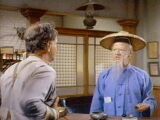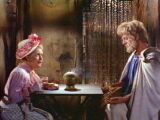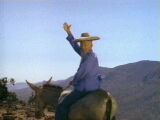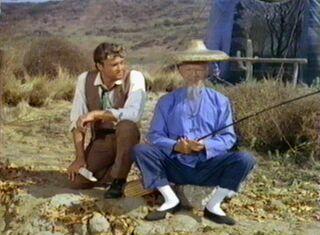7 Faces of Dr. Lao
1964 US
Dir:George Pal
Stars:Tony Randall, Barbara Eden,
Arthur O'Connell, Lee Patrick
Left:John Ericson Right:Tony Randall
Why are we always fascinated with circus performances?
Where does the fascination of circus lie? Even though I've never seen actual
circus performances, it seems to me obvious that whenever we enter a circus tent, some kind of another world suddenly
opens up to us. Although I'm not going to elucidate "Phenomenology of Circus" here, I can just tell that
circus has some power by means of which we can come to realize that ordinary mundane lives are by no means absolute
and definite, and that there certainly are other possibilities of what actually this world could be. In this movie,
there is a scene where one of the audience of Tony Randall's circus, when he has entered the circus tent, expresses
such kind of remark that the circus tent, when seen from the outside, looks so small, but when seen from the inside,
it looks so huge. This scene obviously tells us that circus has something, something beyond ordinary perceptual
recognition, and that our ordinary spatial cognizance is by no means immutable.
What a fascinating story!
Then, from where does this power of circus that can even alter the patterns
of our perception come? Before answering this question, firstly I have to explain the story of this charming movie.
The story begins with the scene where a very very old Chinaman named Dr. Lao played by Tony Randall comes to a
local town riding on a mule, and puts up a circus tent and announces his intention to show circus performances
to the towners. Meanwhile, the whole town is about to be bought up by a greedy bussinessman played by Arthur O'Connell
because he knows the fact that railroad will go through the town in near future, but others don't. Then, circus
starts. To our surprise, an entire circus is performed by just one person; that is, Tony Randall who disguises
himself as seven different circus personalities including Tony Randall himself as an audience of the circus of
his own (To tell the truth, I'm not so sure about whether this Tony Randall's disguises are meant just for the
viewers of this movie alone or it also includes the audience of the circus in this movie itself, especially after
considering the fact that the title itself is "7 Faces of Dr. Lao, and that the movie is cleverly avoiding
such a situation where any two disguises of Tony Randall simultaneously appear in just one scene). The performances
of these circus performers (or rather should say, a circus performer Tony Randall) are quite strange and mystical.
And, it seems that the effect of his circus performances has been quite enormous for the audience and has changed
the views of all those watched them in a quite drastic way, which even extends to the view of Arthur O'Connell
who discards his greedy intention. Finally, Dr. Lao leaves the town but not before he has thus succeeded in changing
the fate of the town.
Circus has the power to let us notice our own ability to view this
world from other angles.
Coming straightly to the conclusion by referring to this story, the question
raised above can be answered in this way; that is, circus has the power to let us notice our own ability to view
this world from other angles than what we usually regard as the only one we can afford to have. For example, there
is a tale about a Tibetan monk who could find as many a different meaning and as many a different divine ecstasy
as every time he drinks just a cup of water with each time altering the angle of the cup he was drinking from.
If we thought this tale was quite ludicrous and too fabulous for us to believe, we should seriously consider the
possibility that it might be because we have been firmly and rigorously educated and incalcated even to such an
extent as believing a nonsense that there is only one way of viewing this world and that the way must be the one
we currently happen to have. According to the books written by famous French philosopher Maurice Merleau-Ponty
and other similar modern writers, perception isn't just a passive process that accepts everything, everything coming
into some receptacle sense organs, but an very active and selective process by way of which just certain necessary
inputs are selected among a bunch of meaningless information by itself. This characteristic of perception has both
positive and negative aspects. The positive side is that essentially we have an ability to form many different
patterns of cognitive way of viewing the world where we actually live. The negative one is that once one way of
doing so has been established, it will become difficult to admit that there definitely are other ways of doing
so, much less actually do so in another way by forgoing the established one unless some fatal deficiencies on the
part of the latter become obvious.
If you change your way of thinking even slightly, you will be able to
see something different from what you always think it should
be.
Obviously socialization of human beings, whatever country you are actually
living in, is deeply rooted to the latter aspect; i.e, the negative aspect of cognitive process. You have to adjust
yourselves to the way the society deems to be right. Therefore, whoever strays from the usual course of socialization
procedure shall be punished in one way or another. It's definitely true that without this socialization process,
the basis of social solidarity would be utterly ruined and the society would become quite unstable. Yet, even so,
I think it's quite important that we shall occasionally remember the fact that there are other ways of viewing
the world and that the way we actually are is by no means equivalent to the way it should be. Because thinking
in this way, we can realize we will certainly be able to improve the current situation. As Richard Rorty, one of
pragmatists of our own age, put it, thinking in the absolutism way that has dominated the thinking of the Western
world for several thousands years since Plato (for that matter, even here in Japan, one of the Oriental countries,
situation hasn't been so different especially after industrialiation was completed) binds us into thinking in the
terms of eternal present. But, there is no such thing as absolute reality devoid of any historical processes, of
which all things in this world are the mere representations with lacking to some degree in pure realness and by
which all those ephemeral representions are to be endorsed. When we enter a circus tent, we are noticed this simple
fact shown the possibility, if very faint, that there definitely are other ways of viewing the world. In the last
scene of this movie, Tony Randall tells a kid that if he changes his way of thinking even slightly, he will be
able to realize such world as Tony Randall has been showing through his circus can exist. This is the essence of
this movie; that is, to notice the fact that we always have an ability to see the world quite differently from
what we are actually seeing. In this regard, this movie is very fantastic, and, at the same time, very thought-provoking.







